splake fishing in america. Rockford: Presa Press, 2013
only in my dreams. Springfield: Gage, 2012.
Beyond Campfire Ashes. Battle Creeek: Gage, 2012.
Backwater Bard Loft Musings. Fort Wayne: The Moon, 2009.
Le Metrop 2012. Ed Gray dir. (dvd).
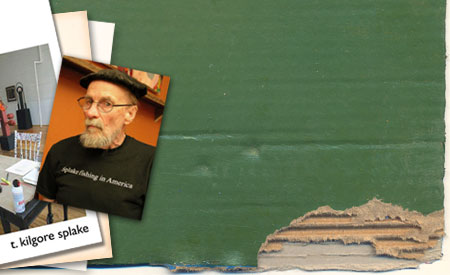
Poet Bryn Fortey said it best: “When splake sends, he really sends.”
Once, both of us received woolly hats from the Calumet, Michigan “Cliffs Dancer”, poet t. kilgore splake. When Bryn wrote and published a poem about the hat in his legendary U.K. Beat print zine “Outlaw”, splake sent him a pair of socks. And a manuscript he wondered if Bryn would care to publish.
Two weeks ago, after indicating to splake that I was interested in seeing what he’d been up to lately, and that I might be able to place a review of his recent work in Empty Mirror, I received a box containing 15 books, two dvds, a splake t-shirt and various interesting press cuttings. The package must have set him back sixty dollars. Now that, my friends, is style. I felt like a little kid at Christmas when I opened it.
splake, for anyone not familiar with the name, is a former college professor who, in middle-age, threw up the safe career he had grown to hate and became a poet.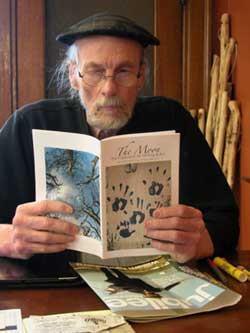 He describes the evolution of his writing from those first tentative efforts on paper plates while camping in the Pictured Rocks wilderness area in the book only in my dreams (2012). Pictured Rocks, splake writes, saved his life during his regular flights from academia and the book is a love song and a lament for a lost haven from what passes for progress in our unbalanced modern minds. For Pictured Rocks, too, has been given a new highway to increase tourism, and ‘larger parking lots, new bridges over small creeks […] plus the requirement to purchase permits to camp in the wilderness areas.’ A depressing picture repeated all across the globe.
He describes the evolution of his writing from those first tentative efforts on paper plates while camping in the Pictured Rocks wilderness area in the book only in my dreams (2012). Pictured Rocks, splake writes, saved his life during his regular flights from academia and the book is a love song and a lament for a lost haven from what passes for progress in our unbalanced modern minds. For Pictured Rocks, too, has been given a new highway to increase tourism, and ‘larger parking lots, new bridges over small creeks […] plus the requirement to purchase permits to camp in the wilderness areas.’ A depressing picture repeated all across the globe.
Beyond Campfire Ashes (2012) collects short poems (which splake is particularly good at), long poems, autobiographical writings and an epistolary novella (of sorts), from the last ten years. Once again the principal theme of splake’s writing is himself, or at least (as English professors worldwide remind us) a persona that appears to be himself projected into the work. It sounds almost like an insult – “oh that splake, always writing with a shaving mirror in front of him” – but particulars reveal universals and his life has been damn interesting. So why not?
And the poems aren’t all about him anyway. Sometimes there are really trenchant observations of others, often people with empty or wasted lives – the soulless materialist of “chairman” or the prisoners of the utter banality of modern online communication in “facebook”. And in backwater bard loft musings (2009), there is “flash”, a poem about a father’s ‘dark hatreds’ and how damaging they are to his son. The son is shown as a “mother’s boy/ puddle of baby fat/ desperately squeezing rope end/ coach screaming/ ‘climb dammit climb’.” I recognise that boy. Hell, I was that boy. Now I can get off the ground without leaving my writing chair.
The latest collection, splake fishing in America (2013), solely poetry this time, continues to mix autobiography with observation, adding, I think, an increased sense of time’s passage without any relenting of the poet’s dedication and defiance. He might write of “gray wordsmith dad/ soon passing over/ coffin burned/ pacemaker in garbage” in one poem (“taste of life”) but in another he’s “quietly waiting/ fire of new ideas/ moments of honest beauty” (“desperate character”). This guy won’t be going gentle into any kind of night, good or otherwise, and for that you have to admire him.
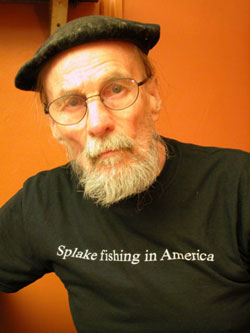 splake’s poetry divides opinion. I’m told some people don’t like it. splake says so himself in Le Metrop, a dvd from 2012, but he’s bullish elsewhere about his abilities – you have to be to make it in a career where there’s almost no reward. The poems are all aligned to the middle of the page with no capitalisation or punctuation, which sometimes makes it difficult to find the rhythm when you read them, especially out loud. But how easy to we want it? Accessibility is good, but if it comes at the expense of a poet sacrificing his natural voice I’d rather not understand too quickly.
splake’s poetry divides opinion. I’m told some people don’t like it. splake says so himself in Le Metrop, a dvd from 2012, but he’s bullish elsewhere about his abilities – you have to be to make it in a career where there’s almost no reward. The poems are all aligned to the middle of the page with no capitalisation or punctuation, which sometimes makes it difficult to find the rhythm when you read them, especially out loud. But how easy to we want it? Accessibility is good, but if it comes at the expense of a poet sacrificing his natural voice I’d rather not understand too quickly.
And splake has a voice. His is one of the most immediately recognisable voices in American poetry. Nobody writes like him, although after you’ve read 15 of his books in one go you find yourself trying to, without meaning it. His style gets into your head like all really original writers. Has anyone tried reading Richard Brautigan without copying him, unconsciously, for a week?
I have known him and liked him for a long time and that, perhaps, makes me a little biased in the way everybody imagines writers are. But splake is someone I always enjoy reading and someone who always makes me think. These books and other things he produces are valuable little gems for anyone who likes their art to be located off the paved highway down in the tall grass near where the river runs. splake, like one of his favourite authors Edward Abbey, is a poet laureate of the disappearing wild footpaths of the heart; and Jesus how we need to save what’s left of them.
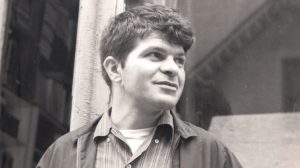
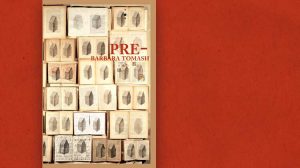
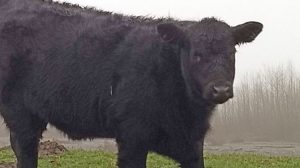
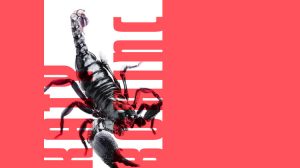

Jack Large says
I’m having real trouble seeing how I could have missed splake completely during my past several years exploration of the poetry of our period. I would have corresponded with him, or at least sent him the suggestion. I just read a review of Kerouac’s Upper Peninsula Diary, with mention of correspondence from the Skagit Valley, prompting the thought, “It’s Dorn!”, someone I knew, before I remembered I was talking about a fiction. I also wondered about the name Kilgore, as a Vonnegut devotee, and that prompted me to speculate whether the t. of his name might be for “trout”, as I am someone who remembers where I was and what I was doing when a beautiful woman whose name I also remember gave me Trout Fishing in America for my birthday. Now I must find splake, and read his every word.
Denis Robillard says
I too can attest to the golden generocities of Kilgore Splake. I am a poet living in Southern Ontario. Splake and I struck up a correspondence a few years ago. He is gracious with his time and is always helpful with younger writers. When we both discovered that we were fans of Brautigan’s work he too spared no expense in sending me a happy birthday load of books and chapbooks. it was indeed a great surprise. My next surprise was seeing my poem on Brautigan published in his Cliff Soundings magazine. What a great spirit this man has!
Tom says
Actually saw Splake this morning. Stopped at the Cafe Rosetta for a cup of tea to take up to work and there he sat. Hadn’t seen him in the flesh and blood for months. Good to know he made it through another winter and is still writing. (Winter here lasted until mid-May) Good review, Bruce.